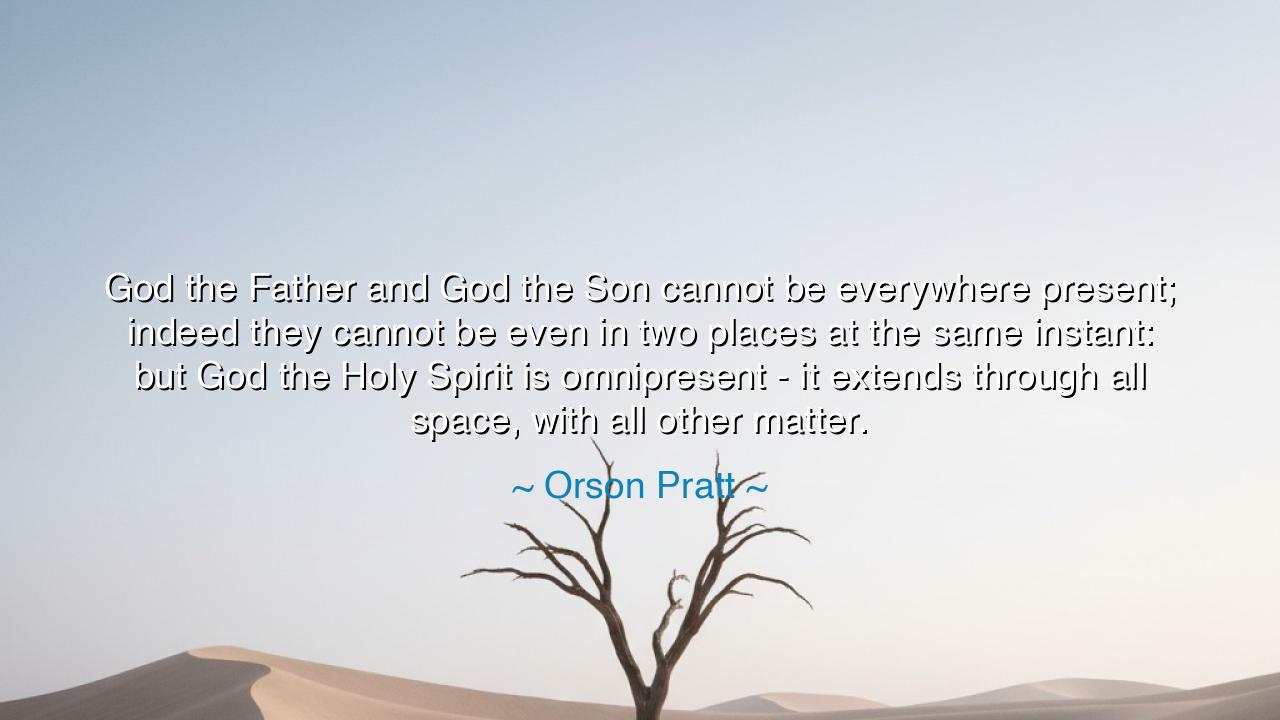
God the Father and God the Son cannot be everywhere present;
God the Father and God the Son cannot be everywhere present; indeed they cannot be even in two places at the same instant: but God the Holy Spirit is omnipresent - it extends through all space, with all other matter.






The quote “God the Father and God the Son cannot be everywhere present; indeed they cannot be even in two places at the same instant: but God the Holy Spirit is omnipresent—it extends through all space, with all other matter” comes from Orson Pratt, a 19th-century theologian and one of the early intellectual pillars of the Latter-day Saint movement. These words reflect his attempt to bridge faith with philosophy, to describe the divine not as something abstract, but as something tangible, orderly, and woven into the fabric of the universe. To him, the Holy Spirit was not an idea drifting in human imagination, but a real, living force, filling all things, linking creation to Creator.
In Pratt’s era, science and theology often collided. The rise of astronomy and physics made thinkers reconsider the nature of space, light, and divinity. Pratt, drawing from both revelation and reason, saw in the cosmos a vast manifestation of divine law—and in the Holy Spirit, the invisible power that sustains and animates it. He argued that while God the Father and God the Son are embodied and exalted beings who dwell in particular realms, the Spirit moves freely through the immensity of existence. It is through this omnipresent Spirit that their will, power, and love are made known to every star, every atom, every soul. Thus, God’s presence fills all things, not by bodily form, but through a sacred, all-pervading energy.
This view echoed the wisdom of earlier mystics and prophets who, though in different tongues, spoke of the same truth: that God is both transcendent and immanent. The Hebrews called it Ruach Elohim, the Breath of God that hovered over the waters. The Greeks called it Pneuma, the divine wind that moves unseen yet gives life to all. And Orson Pratt, standing in the light of modern understanding, gave it new expression, proclaiming that Spirit and matter are not enemies but partners in the divine design — that through the Spirit, all creation is knit together into one living whole.
History offers us glimpses of this divine omnipresence in the lives of the faithful. Consider Isaac Newton, who, while uncovering the laws of motion and gravity, saw in them not mere mechanisms but the fingerprints of God. “This most beautiful system of the sun, planets, and comets,” he wrote, “could only proceed from the counsel and dominion of an intelligent and powerful Being.” Though he lived centuries before Pratt, Newton’s awe before the unity of nature mirrors the same truth: that there is a living Spirit pervading all existence, ordering chaos into harmony, light into purpose.
The meaning of Pratt’s declaration reaches beyond doctrine into the very essence of our relationship with the divine. If the Holy Spirit is truly everywhere present, then there is no distance too great, no darkness too deep for the presence of God to reach. The Spirit touches the exile and the emperor alike. It moves in the silence of prayer, in the birth of a star, in the breath of a newborn. It binds humanity together in the unseen threads of conscience, intuition, and love. To sense this is to live in perpetual reverence — to see that we move not in emptiness, but in sacred space.
Yet this omnipresence does not excuse passivity; rather, it calls for awareness. Many live as though cut off from divine presence, blind to the Spirit that sustains them. The task, then, is not to summon God — for He is already near — but to awaken to His nearness. When we still our minds, when we act with purity, when we speak with kindness, we align ourselves with that infinite current. In such moments, we do not merely believe in God — we commune with Him through His Spirit.
Thus, the final lesson is luminous: though the Father and the Son may dwell in celestial glory, the Holy Spirit dwells among us. It breathes through the wind, it whispers through conscience, it burns in the heart that seeks goodness. To live with awareness of this is to never be alone, to never despair, for divinity is nearer than the air we breathe.
Practical actions: Seek quiet each day to feel the presence that surrounds you. Before judging or speaking in haste, pause and listen for the whisper of the Spirit within. Treat creation — every person, every living thing — as a vessel of the same divine breath. And in your struggles, remember that you are never abandoned; for the Holy Spirit, infinite and unseen, walks beside you always, extending through all space, and touching your heart even now.






AAdministratorAdministrator
Welcome, honored guests. Please leave a comment, we will respond soon